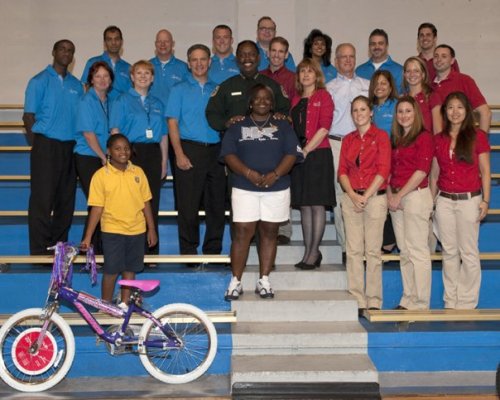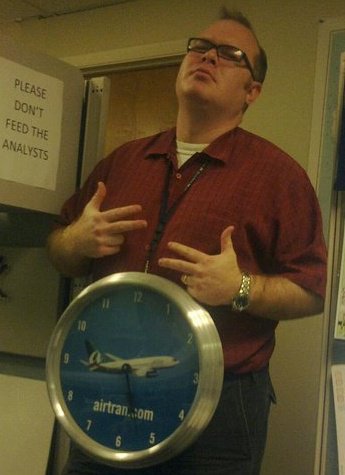Reflections from a former AirTran Employee, One Year Later
Reflections from a former AirTran Employee, One Year Later
- Subscribe to RSS Feed
- Mark as New
- Mark as Read
- Bookmark
- Subscribe
- Printer Friendly Page
- Report Inappropriate Content
The airline industry is tough.
It is tough to compete in, tough to be successful in, and tough to survive in. Case and (in?) point, I am 33 years old, and in the 12 years that I have been in the industry, I have worked for three airlines that have flown into the sunset. Prior to coming to Southwest (where many people still have Employee numbers lower than Wilber and Orville), almost everyone I knew in the industry had at one point or another been on the same career roller coaster. Some of my friends had even been forced to abandon their passion for the industry in search of a more stable means of employment. On September 27, 2010, my search for stability within the industry began for a third time.
When my alarm went off that morning, I reached for my phone to check e-mails and realized this would not be a normal day at the office. It is no understatement to say that receiving an e-mail announcing that your company has been bought has about the same effect as consuming ten caffeine-packed espressos. I was dressed and out the door in record time. When I got to the office, our department (which included revenue management) was assembling in a conference room where our then-Vice President was to brief us on the announcement. I think most of us walked away from that briefing slightly more relieved, but with little solid foundation for the relief because of the vagueness that was required because of the Department of Justice approvals that would be forthcoming.
Some people were excited, some were cautious, and some (including myself) took the news with a healthy amount of both of these emotions. The reputation of Southwest Airlines’ attitude towards its Employees is legendary in not only this industry, but any industry. But on the other hand, the fate of acquired airlines (and their employees) is also legendary across industries. Especially because of our position within the company (Network Planning and Revenue Management), our department was probably one of the ones that was more sensitive to inter-mingling prior to legal close. After all, until May 2, 2011, Southwest Airlines and AirTran Airways were still competitors in one of the most brutal industries around, and our respective departments held some of the most closely guarded network growth and pricing secrets.
So began seven months of waiting and hoping. Most of us were sure that Southwest would live up to its reputation and do right among its newly acquired “family,” but even if they did we also realized that our old “family” would be split up. The AirTran headquarters in Orlando where I worked, was a fraction of the size of the Southwest headquarters. There were around 200 people working in departments like SOC, accounting, finance, revenue management, planning, IT, facilities, and the executive offices (the AirTran marketing department was located in Atlanta). Everyone who had been there for more than a few days knew everyone else, if not by name then definitely by sight. Although it was different than the Southwest version, there was definitely a sense of culture and camaraderie that linked us together, and it was a sad feeling to know that some of my friends would not be able to move to Dallas because of family or personal reasons, even if Southwest was as welcoming as we all hoped.
Finally, May 2 came, and I personally felt a sense of relief, but at the same time apprehension. There are two ways to approach an acquisition: with a know-it-all approach, which assumed that this would be a happy day for each party with disregard for the emotional complexity of the situation, and an approach that respects the fact that there will be mixed emotions involved in such a complex situation and that works to welcome each person while they work through those emotions in their own ways. For me personally, I am happy to say that the latter was the case. May 2 is a blur to me as we were finally able to meet and talk to our counterparts. For airline nerds (and I use that term affectionately), this was really a treat. We were finally able to legally pick through the minds at another airline, ask them how they did things, what their strategy was for certain moves that we had seen second-hand, and the biggest question of all … what’s next? After sufficiently geeking-out for most of May 2, we began putting the plan together for not only the airline but also ourselves.

Volunteering at Paramore Kidz Zone
In early August 2011, I moved to Dallas where I am still working on AirTran schedules as a Network Planner in headquarters. Aside from the other members of my Team who also came to Dallas, I will see a familiar face or two around headquarters, and even more occasionally I will see a green AirTran badge from someone who has been brought to Dallas for training or to get their new badge, and I will say hello and welcome (or “Howdy” or “Yee-Haw!” depending on how Texan I’m feeling that day).
So I stick to my original introduction—this industry is tough; however, I also am optimistic that stability is possible. Since I have arrived at Southwest, I have heard constant discussion about our “cultural advantage” and how our identity gives us an advantage over other airlines. With Customer loyalty and brand recognition ratings to match these claims, there can be no doubt that we have an advantage in this area. However, today more than ever with fuel at all-time highs and an increasing pack of bold competitors, Culture has to mean that we are smarter than the other airlines—smarter in the way we build our strategy, smarter in the way we package our product, smarter in the way we price our product, and smarter in the way we deliver our product. History is littered with great companies that failed to keep up with the times (I can personally vouch for that), and past success does not guaranty future success. In fact, about the only thing it does guarantee is that you will have a target on your back from someone who thinks they can do it better than you.

Christian, as Flava Flaaaaav! Yeaaah, boyee!
The airline industry is tough.
We can be tougher together.
You must be a registered user to add a comment. If you've already registered, sign in. Otherwise, register and sign in.